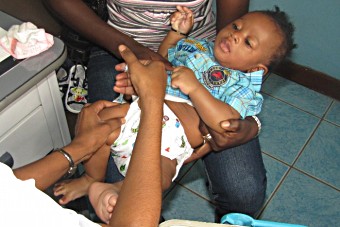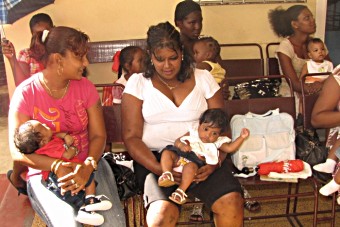
A baby being administered the new PCV 13 vaccine. Source: GINA/2011.
Georgetown, Guyana, 19 January 2011 (Government Information Agency) - The Health Ministry in its unrelenting fight to continuously promote family health through the improvement of maternal and child health, has intensified efforts towards ensuring the immunization of all children by providing vaccination coverage against contagious diseases.
The Ministry, today, added another vaccine to those that are already available - the pneumococcal conjugate vaccine (PCV13) which protects against 13 strains of the pneumococcal infections which severely affects children.
PCV 13 replaces the PCV 7 conjugate vaccine which was in use from 2009 and protects against 7 pneumoccal types.
Minister of Health, Dr. Leslie Ramsammy in his address to the mothers gathered at the Herstelling Health Centre stressed the importance of having children immunized since this gives them the advantage to live healthier lives as they develop.
In 2001 there were three vaccines which were in preparation internationally the Pneumococcal, rotavirus and HPV vaccines. Following this awareness a commitment was made to obtain these vaccines when they became commercially available. In 2009 the Pneumococcal vaccine was introduced with Guyana being one of the first developing countries to do such.
The Minister noted that the PCV 13 provides a wider span of protection against infections that can severely affect young children. This new vaccine is given to infants and toddlers to protect them from the risk of attracting serious diseases caused by the pneumococcal bacteria such as pneumonia, ear infections, and meningitis. It is administered at the same time with other vaccines including diphtheria, tetanus, acelluar or whole-cell pertussis, haemophilus influenza type b, hepatitis, rotavirus and oral polio.
The vaccine will also be given to infants with sickle cell disease or any other chronic illnesses, however children who are very ill will require consultation with a doctor before administration. There are a few side effects which may occur such as slight fever and pains to the injection site.

Mothers gathered at the Herstelling health centre for their scheduled clinic day.
Source: GINA/2011
Administration of the PCV 13, which is free, commenced at all health centres in January with three doses given at 2 months, 4 months and 6 months; while a forth dose is given when the child is 12 months.
In recent years, a vaccination campaign was launched for vaccine-preventable diseases such as Measles, Mumps, Rubella and Yellow-Fever. The campaign was very successful with over 90% coverage. Particular attention has also been given to remote locations such as Regions One, Seven, Eight and Nine to ensure that they are logged on to the Ministry's immunization programme.
The Minister disclosed that in 2010 between 95 to 98 percent of children were administered 15 different kinds of vaccines however this indicates that children were missed in the process. In this regard, he stressed that every child should be vaccinated.
Dr. Ramsammy noted that in ensuring that every child in Guyana is immunized the Ministry needs to have a relationship with parents and communities to realize that effort. He urged parents to take their children to the health centres to receive the necessary vaccines.
The impact of the immunization programme has resulted in the reduction of deaths and illnesses of young children. Twenty years ago the death rate was 100 in every 1000 children. That has now reduced to 20 in every 1000; this is mainly a result of the protection vaccines offered.
He pointed out that the immunization programme in 2011 will cost the Health Ministry $400M for its sustenance of which the Government is providing 91 percent while the remainder is provided by the sector's international partners which include the World Health Organisation (WHO), Pan American Health Organisation (PAHO) and the Global Alliance on Vaccine and Immunisation (GAVI).
